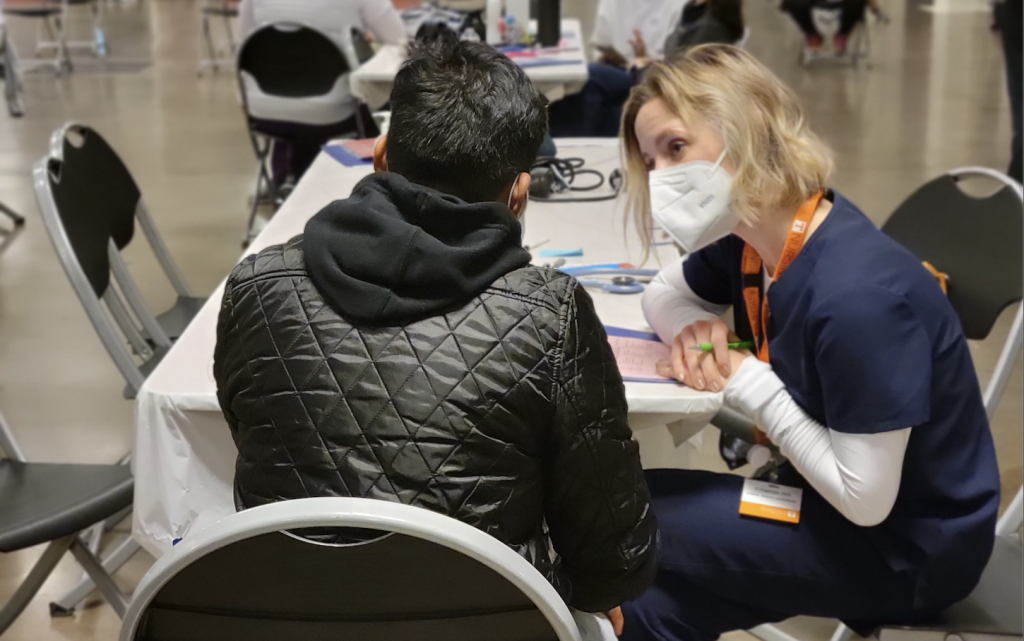URL: https://nursing.utk.edu/2022/02/16/college-of-nursing-awarded-grant-for-ethrive/

The University of Tennessee, College of Nursing, has received a grant from the Health Resources and Services Administration for Empowering and Transforming public Health nursing education and practice for Rural underserved areas to Improve care using Virtual-based simulation and Experiential strategies.
To strengthen and retain the public health nursing workforce in rural Appalachia, the college will partner with Remote Area Medical, to accomplish the goals of the eTHRIVE project. RAM is a major nonprofit organization whose mission is to prevent pain and alleviate suffering by providing free, quality healthcare to those in need.
“A strong emphasis of the eTHRIVE project is to expand the capacity to substantially benefit care for rural, underserved communities by creatively and skillfully preparing nurses for holistic, empathic public health nursing care,” said Lisa Davenport, clinical associate professor, and project director. “All of which has fidelity to a worthy purpose.”
The interdisciplinary eTHRIVE team includes Lisa Davenport, project director; Vicki Gregg, RAM site coordinator; Meghan Parson, project manager; Susan Hébert, lead faculty simulation; Xueping Li, lead faculty engineering; and Social Work Office of Research and Public Service (SWORPS), evaluator.
The eTHRIVE team’s shared vision is to co-design and implement meaningful virtual-based simulation and experiential learning opportunities for RN to BSN students and enhance training for the RAM volunteer nursing workforce.
A pioneering cohort of six RN to BSN students actively participated in a RAM clinic this weekend, and an additional twenty-two students participated in a synchronous virtual simulation experience, forging the way for the innovative initiative.
“This grant provides experiential learning offerings for a dual audience, the online RN to BSN program, and the RAM nursing workforce,” said Hébert. “The asynchronous simulation modules developed through the grant promotes transfer of didactic content to applied practice opportunities for clinical nursing not previously experienced by either learner population. The innovative content includes motivational interviewing, nursing theory, and public health competencies necessary to promote healthy lifestyles related to common health care issues found in the RAM east Tennessee population.”
The project will run over the course of the next two years. The project team will develop and implement asynchronous virtual simulation modules to improve the knowledge, skills, self-efficacy, and empathy of 150 RN to BSN students and as many as 5,000 nurses currently providing care in rural Appalachia.
“This grant provides nursing students exposure to patients in their own environment,” said Vicki Gregg, clinic manager at RAM. “Students are able to see how the lack of healthcare affects people outside of an acute care setting and what people are willing to do for medical, vision, and dental services. The effect is usually profound, which impacts RAM’s mission by increasing the desire to give back and volunteer after graduation, allowing RAM to service more people.”
The team will work with RAM to incorporate telehealth technology into their healthcare services.
“The importance of public health has been brought to the forefront as we have navigated a global pandemic,” said Victoria Niederhauser, dean of the college. “The eTHRIVE program will strengthen the abilities of our nursing graduates to overcome challenges and improve health outcomes in rural Tennessee and beyond.”
—
CONTACT:
Kara Clark Cardwell (kmclark2@utk.edu, 865-974-9498)
The eTHRIVE project is supported by the Health Resources and Services Administration (HRSA) of the U.S. Department of Health and Human Services (HHS) under 1 U4EHP42431‐01‐00 and Nurse Education Practice Quality Retention Simulation Education Training grant. This information or content and conclusions are those of the author and should not be construed as the official position or policy of, nor should any endorsements be inferred by HRSA, HHS, or the U.S. Government.